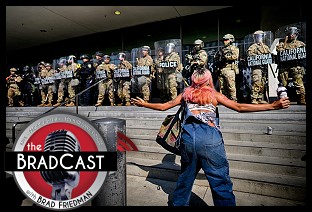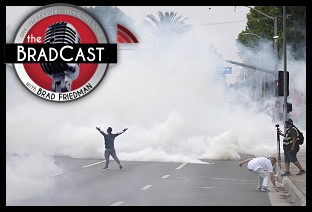Getting a bit too wonky even for myself here. So I'll hope the BRAD BLOG readers will tolerate this bit of wonkery for the moment. I believe it's important.
In case you're not familiar, an anonymous career CIA analyst/foreign policy expert, having served decades, and still employeed by the agency as I understand it, is releasing a book in a few weeks which is highly critical of the Bush Administration's "War on Terror".
In Imperial Hubris: How the West is Losing the War on Terror the author, Anonymous, goes into a much detailed account of where we went wrong, and what few options we now may be left with.
For those who would (as those who inevitably will, for partisan reasons) see this as just another Bush Bash Fest, it would be a mistake to do so, since Anonymous' prescription for what to do now, is decidely "un-Liberal". Essentially, he calls for Total War. But for an explanation of that actually means --- and how it differs from what is being waged now --- you'll need to read Spencer Ackerman's full article (over on Talking Points Memo where he's currently filling in for the vacationing Josh Marshall).
For the moment, what caught my eye was a useful and sobering post-mortem on where things now stand in both Afghanistan and Iraq:
Then there's Iraq. "[T]here is nothing bin Laden could have hoped for more than the American invasion and occupation of Iraq," he writes.
All Muslims would see each day on television that the United States was occupying a Muslim country, insisting that man-made laws replace God's revealed word, stealing Iraq's oil, and paving the way for the creation of a "Greater Israel." The clerics and scholars would call for a defensive jihad against the United States, young Muslim males would rush from across the Islamic world to fight U.S. troops, and there--in Islam's second holiest land--would erupt a second Afghanistan, a self-perpetuating holy war that would endure whether or not al-Qaeda survived.
The reason we've made these mistakes, he argues, is that we fail to understand that bin Laden doesn't hate us because of our freedom. Or, rather, while he does hate the licentiousness and modernity that the U.S. represents, it's not what compels him to declare war on us. Nor does an anti-modernist bent explain bin Laden's appeal across the Muslim world. Instead, it's what Anonymous identifies as six points bin Laden repeatedly cites in his communiquÚs: "U.S. support for Israel that keeps the Palestinians in the Israelis' thrall; U.S. and other Western troops on the Arabian peninsula; U.S. occupation of Iraq and Afghanistan; U.S. support for Russia, India and China against their Muslim militants; U.S. pressure on Arab energy producers to keep oil prices low; U.S. support for apostate, corrupt and tyrannical Muslim governments." Combined with his charismatic biography, bin Laden's strategic success has been to frame these arguments through a Koranic prism, "to convince everyone that U.S. policy is deliberately anti-Muslim and anti-Islamic," he says. Bin Laden's critique presents in resonant Islamic terminology a coherent jihadist explanation for practically everything Muslims can find offensive about the U.S.--the most deadly slippery slope there is. And the more Americans insist on treating bin Laden's anger with the U.S. as a pure hatred of freedom, the less equipped we'll be to answer him in a battle of ideas. [emphasis added]
I realize these arguments may be a bit more nuanced and informed than is easily fit onto Headline News, Larry King's brain, or the general limited scope of a Fake Conservative's knee-jerk ideological pallette.
The battle of "Good vs. Evil" is much easier to get across to the Nascar Dad Joe-Sixpacks on whom Dubya's re-election chances now hinge.
None the less, until the United States cares to take a real, sobering, and --- yes --- nuanced look at what this "War" is really about, we're destined to simply keep spinning our wheels in a never-ending, ever-increasing bloody battle that simply cannot be "won".


 Sunday 'Total Obliteration' Toons
Sunday 'Total Obliteration' Toons Thank You For Your Attention to This Matter:
Thank You For Your Attention to This Matter: 'Green News Report' 6/26/25
'Green News Report' 6/26/25
 Mamdani Primary 'Win' Augurs New Generation of Progressives Rising: 'BradCast' 6/25/25
Mamdani Primary 'Win' Augurs New Generation of Progressives Rising: 'BradCast' 6/25/25 U.S. Authoritarianism Under-way (But We're Still Here to Fight It): 'BradCast' 6/24/25
U.S. Authoritarianism Under-way (But We're Still Here to Fight It): 'BradCast' 6/24/25 'Green News Report' 6/24/25
'Green News Report' 6/24/25 'Anti-War' Trump Attacks a Mid-East Nation on False Claims About WMD: 'BradCast' 6/23/25
'Anti-War' Trump Attacks a Mid-East Nation on False Claims About WMD: 'BradCast' 6/23/25  Sunday 'Peacemaker' Toons
Sunday 'Peacemaker' Toons Senate Health Care Cuts 'More Extreme' Than House Version: 'BradCast' 6/19/25
Senate Health Care Cuts 'More Extreme' Than House Version: 'BradCast' 6/19/25 'Green News Report' 6/19/25
'Green News Report' 6/19/25 What 'Anti-War President'? MAGA Civil War Over Trump, Iran: 'BradCast' 6/18/25
What 'Anti-War President'? MAGA Civil War Over Trump, Iran: 'BradCast' 6/18/25 Trump Calls for 'Remigration', a Codeword for 'Ethnic Cleansing': 'BradCast' 6/17/25
Trump Calls for 'Remigration', a Codeword for 'Ethnic Cleansing': 'BradCast' 6/17/25 'Green News Report' 6/17/25
'Green News Report' 6/17/25 Last Weekend Today: 'BradCast' 6/16/25
Last Weekend Today: 'BradCast' 6/16/25 Sunday 'Despot Times, Despot Measures' Toons
Sunday 'Despot Times, Despot Measures' Toons Then They Came for the U.S. Senators: 'BradCast' 6/12/25
Then They Came for the U.S. Senators: 'BradCast' 6/12/25 'Green News Report' 6/12/25
'Green News Report' 6/12/25 Lawless Trump Warms Up for Insurrection Act: 'BradCast' 6/11/25
Lawless Trump Warms Up for Insurrection Act: 'BradCast' 6/11/25 Trump Inciting Violence, State of Fear in L.A., Elsewhere: 'BradCast' 6/10/25
Trump Inciting Violence, State of Fear in L.A., Elsewhere: 'BradCast' 6/10/25 Nevermind Elon and Epstein Files, Trump Declares L.A. 'Riots'!: 'BradCast' 6/9/25
Nevermind Elon and Epstein Files, Trump Declares L.A. 'Riots'!: 'BradCast' 6/9/25 'Jesus Weeps' at Trump's
'Jesus Weeps' at Trump's 300k 'Preventable' Deaths Since Trump USAID Shutdown: 'BradCast' 6/4/25
300k 'Preventable' Deaths Since Trump USAID Shutdown: 'BradCast' 6/4/25 Storm Warnings: 'BradCast' 6/3/25
Storm Warnings: 'BradCast' 6/3/25 SCOTUS Ignores Own Precedents In Recent 'Emergency' Rulings: 'BradCast' 6/2/25
SCOTUS Ignores Own Precedents In Recent 'Emergency' Rulings: 'BradCast' 6/2/25 'A World of Tyrants, Bribes, and Influence': 'BradCast' 5/22/25
'A World of Tyrants, Bribes, and Influence': 'BradCast' 5/22/25
 VA GOP VOTER REG FRAUDSTER OFF HOOK
VA GOP VOTER REG FRAUDSTER OFF HOOK Criminal GOP Voter Registration Fraud Probe Expanding in VA
Criminal GOP Voter Registration Fraud Probe Expanding in VA DOJ PROBE SOUGHT AFTER VA ARREST
DOJ PROBE SOUGHT AFTER VA ARREST Arrest in VA: GOP Voter Reg Scandal Widens
Arrest in VA: GOP Voter Reg Scandal Widens ALL TOGETHER: ROVE, SPROUL, KOCHS, RNC
ALL TOGETHER: ROVE, SPROUL, KOCHS, RNC LATimes: RNC's 'Fired' Sproul Working for Repubs in 'as Many as 30 States'
LATimes: RNC's 'Fired' Sproul Working for Repubs in 'as Many as 30 States' 'Fired' Sproul Group 'Cloned', Still Working for Republicans in At Least 10 States
'Fired' Sproul Group 'Cloned', Still Working for Republicans in At Least 10 States FINALLY: FOX ON GOP REG FRAUD SCANDAL
FINALLY: FOX ON GOP REG FRAUD SCANDAL COLORADO FOLLOWS FLORIDA WITH GOP CRIMINAL INVESTIGATION
COLORADO FOLLOWS FLORIDA WITH GOP CRIMINAL INVESTIGATION CRIMINAL PROBE LAUNCHED INTO GOP VOTER REGISTRATION FRAUD SCANDAL IN FL
CRIMINAL PROBE LAUNCHED INTO GOP VOTER REGISTRATION FRAUD SCANDAL IN FL Brad Breaks PA Photo ID & GOP Registration Fraud Scandal News on Hartmann TV
Brad Breaks PA Photo ID & GOP Registration Fraud Scandal News on Hartmann TV  CAUGHT ON TAPE: COORDINATED NATIONWIDE GOP VOTER REG SCAM
CAUGHT ON TAPE: COORDINATED NATIONWIDE GOP VOTER REG SCAM CRIMINAL ELECTION FRAUD COMPLAINT FILED AGAINST GOP 'FRAUD' FIRM
CRIMINAL ELECTION FRAUD COMPLAINT FILED AGAINST GOP 'FRAUD' FIRM RICK SCOTT GETS ROLLED IN GOP REGISTRATION FRAUD SCANDAL
RICK SCOTT GETS ROLLED IN GOP REGISTRATION FRAUD SCANDAL VIDEO: Brad Breaks GOP Reg Fraud Scandal on Hartmann TV
VIDEO: Brad Breaks GOP Reg Fraud Scandal on Hartmann TV RNC FIRES NATIONAL VOTER REGISTRATION FIRM FOR FRAUD
RNC FIRES NATIONAL VOTER REGISTRATION FIRM FOR FRAUD EXCLUSIVE: Intvw w/ FL Official Who First Discovered GOP Reg Fraud
EXCLUSIVE: Intvw w/ FL Official Who First Discovered GOP Reg Fraud GOP REGISTRATION FRAUD FOUND IN FL
GOP REGISTRATION FRAUD FOUND IN FL

































